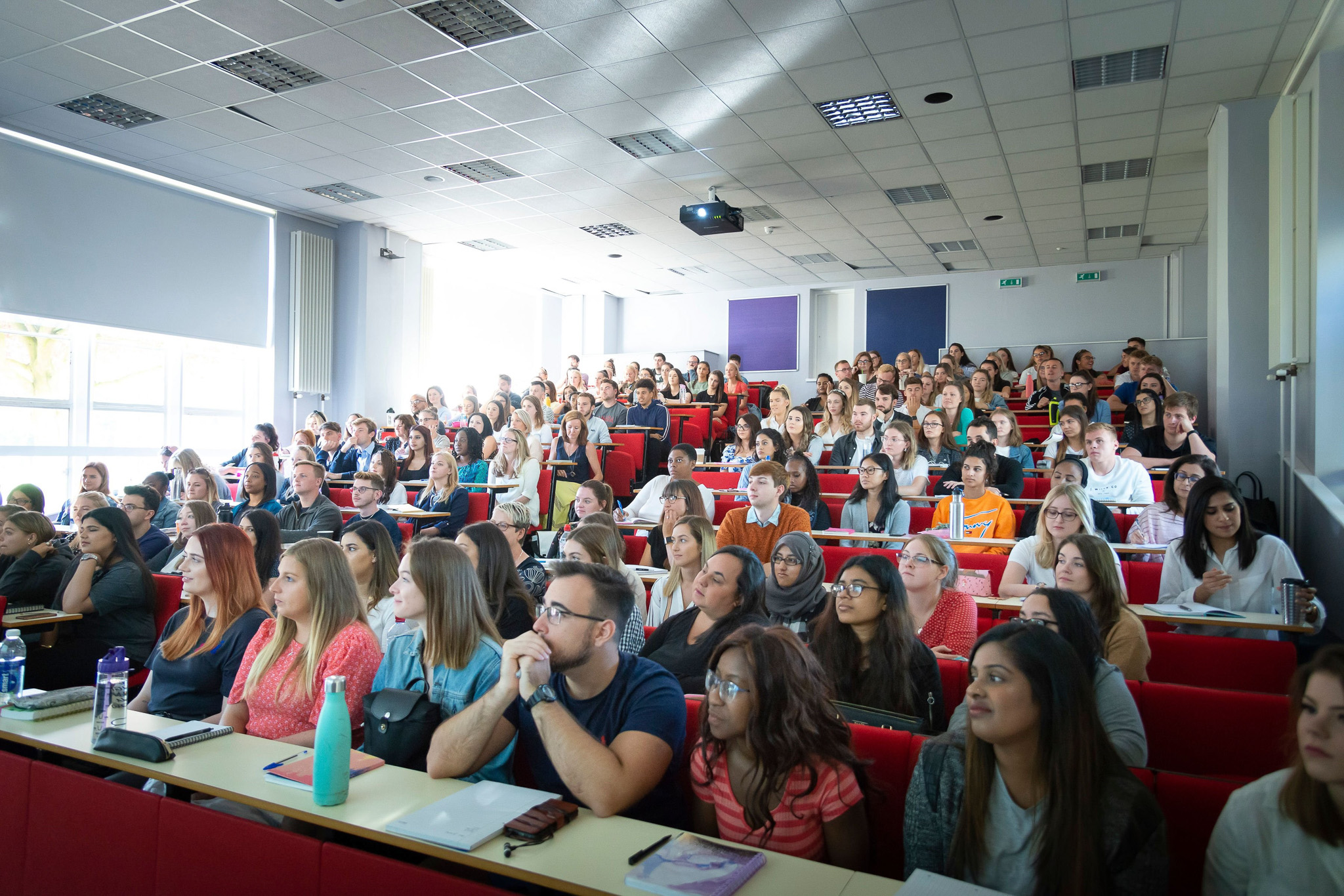Formatio: grow your own trainee teachers with paid internships
 Why isn’t teaching represented at careers fairs?
Why isn’t teaching represented at careers fairs?
It was this observation that led to the launch earlier this year of the Plant The Seed paid internship scheme aimed at Catholic school alumni across the Archdiocese of Westminster.
In June university students at the end of their second year will undertake a three-week internship in schools within the Archdiocese. They will receive £300 per week to cover expenses, along with a programme of lesson observation, paired teaching opportunities, mentoring, meeting with early career teachers, and training in safeguarding and lesson planning.
The students then have the option of registering with an Initial Teacher Training provider such as All Saints Catholic Academy Trust; Diocese of Westminster Academy Trust; or Saint John Southworth Catholic Academy Trust, supported by Twickenham-based St Mary’s (pictured), one of four Catholic universities in England.
A bursary is also available for those choosing to train as a Religious Education (RE) teacher in secondary schools, in a bid to tackle a national shortage in the subject.
The Plant The Seed initiative is being led by Catherine McMahon, Deputy Director of diocesan education service. She said: “I noticed that you have all these professions represented at careers fairs — but not teaching.
“The leaders of tomorrow’s schools are in our schools today, so we’re now putting students on the path to Catholic universities and multi-academy trusts offering teacher training.”
The internship is funded by the Cardinal’s Lenten Appeal, and is the first stage in a multi-year programme of continuing professional development and leadership development for teachers, including flexible working options to retain existing staff and support those returning to the profession.
Five students have signed up to the scheme so far, with more expected to join as the academic year progresses. Last summer seven students took part, who are now considering careers in teaching as they approach the end of their third year at university.
The Formatio partnership supports the CES and diocesan schools commissions to work with the four Catholic universities and Catholic multi-academy trusts in implementing strategies for school leadership and governance, as commissioned by the Bishops in 2017.
‘It helps them concentrate, but it also helps to get the children in school’: case study of a Catholic school breakfast club
 For 13 years a free breakfast club at a voluntary aided Catholic school in Merseyside has been helping tackle child poverty, improve concentration and – since the pandemic – boost attendance.
For 13 years a free breakfast club at a voluntary aided Catholic school in Merseyside has been helping tackle child poverty, improve concentration and – since the pandemic – boost attendance.
Two thirds of pupils at Our Lady Star of the Sea Catholic Primary School, in Seaforth, Archdiocese of Liverpool, are eligible for Free School Meals and the Pupil Premium, more than double the national average.
Each day every pupil from Reception to Year 6 are offered fruit, cereal, toast, baked beans and a bagel from 8am, as well as occasional porridge, and hot chocolate milk on cold days. This is supported through local partnerships with Magic Breakfast and Tesco arranged by Deanne Arden, the school’s Business Manager.
She said: “We are in an area of high deprivation. They might arrive in school hungry, but they're not hungry for the rest of the morning, having health food at the start of the day. It helps them concentrate, but it also helps to get the children in school.”
This has helped improve attendance since the pandemic, particularly from pupils with anxiety or emotional school avoidance behaviour, who appreciate the calming, social environment before classes and schoolwork begin.
Parents are grateful to drop off their child early so they can then make sure their older children get to secondary school on time. After hours Our Lady Star of the Sea also offers wraparound childcare to support parents.
Headteacher Claire Roberts said: ”With the cost of living crisis, we know how hard it is for our working families, so the free breakfast club gives our parents the flexibility to go to work and to not worry about the costs of childcare.”
Further initiatives to relieve child poverty include a second-hand uniform service, while parents donate non-uniform clothes their children have outgrown which are then made available to others in need.
Pupils also receive vouchers from the parish branch of the St Vincent de Paul charity, with donations providing vouchers, toys and pyjamas for pupils, in addition to Free School Meal vouchers designed to provide food during school holidays.
Our Lady Star of the Sea has also received the national School of Sanctuary award for welcoming refugee and asylum seeker children.
Miss Arden said: “When we've had new people start and new arrivals new to the country, we've given them the uniform that we have here. If children come in not wearing a coat, we will give them a coat that's been donated to us.”
Find out more about Catholic education in the Archdiocese of Liverpool
Social justice champions: how Catholic schools work with Metro Mayors and local government
 Catholic schools across the country are working with Metro Mayors, regional government and local authorities on social justice issues like child poverty and youth mental health.
Catholic schools across the country are working with Metro Mayors, regional government and local authorities on social justice issues like child poverty and youth mental health.
This is due to Catholic Social Teaching, which is based on the encyclicals of current and former Popes, and principles such as solidarity and subsidiarity, to provide a framework for contemporary practical application.
A £1 bus fare cap for under-21s – campaigned for by St Thomas More Catholic Sixth Form students – was extended in November by the new Mayor of the North East, Kim McGuiness (pictured, centre, with St Thomas More representatives), potentially until 2028, as part of a package of measures she launched to tackle child poverty.
Students from the sixth form, which is in North Shields, Hexham and Newcastle Diocese, had previously persuaded a former North of Tyne Mayor to introduce the fare cap in 2023.
At Runnymede St Edward’s Catholic Primary School, in Liverpool Archdiocese, Metro Mayor Steve Rotheram saw how artificial intelligence (AI) has used data to identify gaps in pupils’ learning and tailor support accordingly.
In October the Mayor announced a pilot of the AI service for all schools in the region, delivered by education technology company CENTURY, during an event at Runnymede St Edward’s, with pupils interviewed on BBC Radio 4’s Today programme.
In Bristol, St Bede’s Catholic College headteacher, Robert King, worked with Mayor Dan Norris and the West of England Combined Authority to introduce a new bus service. This was to partly replace one cut by operator First Bus, a decision which had been negatively affecting students and local residents.
School-based mental health counselling for all Year 9s was launched in October by Brighton and Hove Council, a city-wide pilot initiative introduced after successful representations from Cardinal Newman Catholic School.
The Arundel and Brighton Diocese-based secondary had previously worked with local NHS services for nearly a decade to help support students experiencing mental health issues.
Find out more about Catholic Social Teaching in schools
Catholic primary school tops Sunday Times list
 St Filumena’s Catholic Primary School, in Stoke-on-Trent, has scooped the accolade of Primary School of the Year in the West Midlands 2025, in the new Sunday Times Parent Power schools guide.
St Filumena’s Catholic Primary School, in Stoke-on-Trent, has scooped the accolade of Primary School of the Year in the West Midlands 2025, in the new Sunday Times Parent Power schools guide.
Edward Howard, Executive Principal at the Birmingham Archdiocese-based school, said the announcement was a testament to the hard work and commitment of everyone connected to the school.
He said: “We are absolutely thrilled, this is fantastic news for the St Filumena’s family. To be named Primary School of the Year in the West Midlands is a huge achievement. Everyone at St Filumena's believes that education involves more than just delivering the National Curriculum. We equip our pupils with the skills and attitudes they need to become confident, independent and successful learners based on our Catholic values.
“Our motto 'I am loved' serves as a constant reminder to all to achieve their true potential as a unique child of God. The school has high expectations of all pupils regardless of ability, creed or gender. We instil our pupils with a sense of personal and collective responsibility, and we place a great emphasis on the personal, social, spiritual and health education of our pupils.
“The school works to enable everyone to become a responsible, happy and tolerant citizen in order to prepare them for the opportunities, responsibilities and experiences of life in our rapidly changing society.”
Mr Howard explained the school’s curriculum vehicles are learning themes taught alongside the National Curriculum and often go beyond its scope to equip pupils with essential skills necessary for the future, incorporating teamwork, relationships, cultural appreciation, managing time and resources, as well as global awareness and responsibility.
In October, Ofsted judged St Filumena’s to be outstanding in all areas of work, achieving the highest possible recognition, stating: "This school provides an exceptional standard of education because of the clear vision and supportive culture that has been developed. In partnership with the trust, leaders are insistent that every pupil will achieve well.”
Earlier this year St Filumena’s received three letters for academic achievements from the Minister of Schools. The first letter recognised the school as being in the top 1% of primary schools nationally for end of primary school achievement; the second for being in the top 200 schools nationally for the Year 4 multiplication check; and the third for being in the top 1% of primary schools nationally for Year 1 phonics, with 100 percent of pupils in Year 1 at St Filumena’s meeting the expected standard.
St Filumena’s also holds an Artsmark Silver Award; CAFOD’s LiveSimply Award and Excellence in Music Gold Award.
The school is part of the Painsley Catholic Academy group of schools in north Staffordshire.

